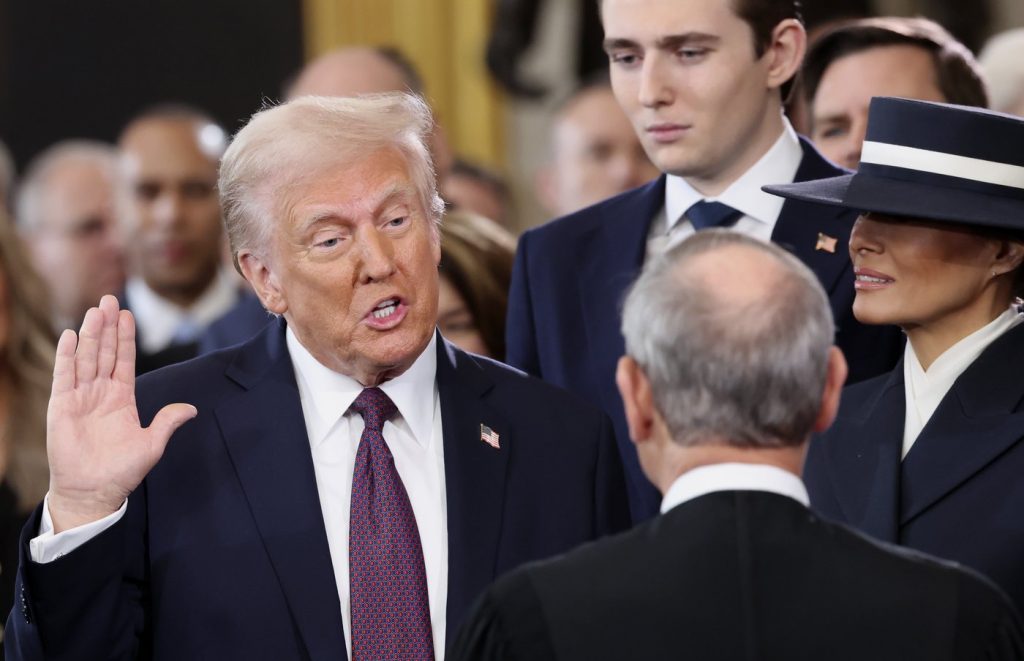President Donald Trump's First Week in Office: A Bold Start
WASHINGTON (AP) - As President Donald Trump navigates his first week in office, the early actions provide insight into what his next four years may entail. Within hours of his inauguration on January 20, 2025, Trump signaled an assertive approach by pardoning over 1,500 individuals convicted or charged in connection with the January 6, 2021, Capitol attack. Among those pardoned were individuals who violently clashed with police that day, a decision that contradicted earlier statements by his vice president, JD Vance, and senior aides regarding the nature of the pardoned individuals.
These pardons were just the beginning of a series of actions intended to reinforce loyalty among allies and assert power over critics. Trump’s confidence is bolstered by the absence of concerns about reelection—per the Constitution, he is unable to serve a third term—and by the Supreme Court's interpretation granting expansive immunity to presidents. With Republican control in Congress, he appears to operate without constraints.
By revoking security details for prominent figures like Dr. Anthony Fauci, former national security adviser John Bolton, and Secretary of State Mike Pompeo—protections that were maintained by the Biden administration amid credible threats—Trump demonstrated a willingness to marginalize past officials. Additionally, he revoked security clearances for several former officials who criticized him, signaling a more aggressive stance against dissent within his administration.
Organizational Improvements and Strategic Focus
Contrasting with his first term marked by chaos, Trump displayed a more strategic and organized approach upon his return to office. He began swiftly implementing executive orders and initiating significant policy shifts, aiming to leave a substantial imprint on his presidency from the outset. Learning from previous experiences, Trump appears more adept at navigating the complexities of the presidency and addressing staff issues more effectively.
Quick to oust Biden administration appointees, Trump sought to install loyalists while dismantling a range of diversity, equity, and inclusion initiatives. His first actions included sending federal troops to the U.S.-Mexico border and rolling back guardrails on AI and cryptocurrency development that were previously established during Biden's term. This sharp departure from his earlier presidency’s tumultuous start reflects a more focused agenda in pursuit of his policy goals.
Despite showing signs of maturity in his approach, Trump retains his assertive communication style. Shortly after delivering a measured inaugural address, he held a raucous event with governors and supporters where he criticized Joe Biden and his administration, reaffirming his intention to dominate national discussions.
Legal Challenges Ahead
As Trump embarks on potentially controversial policies, including attempts to diminish civil service protections and alter laws regarding birthright citizenship, legal challenges are expected. An immediate setback occurred when U.S. District Judge John Coughenour stated Trump's birthright citizenship order was "blatantly unconstitutional," indicating the legal hurdles he may face as his presidency develops.
Economic Strategies Focused on Oil
Trump's economic strategy heavily emphasizes increasing domestic oil production, which he describes as "liquid gold." He believes that ramping up oil production will lower inflation and reduce funding for Russia amidst its ongoing war in Ukraine. Trump asserted that utilizing the United States' vast oil and gas resources would lead to a manufacturing boom and economic revitalization, despite ongoing climate considerations.
Engaging with Wealthy Tech Figures
During his inaugural events, Trump's interactions with prominent billionaires, including Elon Musk, Jeff Bezos, and Mark Zuckerberg, showcased his willingness to engage directly with influential figures in the tech industry. However, this association comes with its own complexities, as rivalries among these billionaires could complicate collaborations on significant initiatives like artificial intelligence investment.
Historical Inspirations
Trump's admiration for historical figures like President William McKinley has resurfaced, particularly regarding tariffs used to finance government spending. He argues that McKinley's era was a prosperous time for the nation. However, economists highlight the economic challenges of McKinley's presidency, cautioning against reversion to outdated policies that may not suit the complexities of modern governance.
As Trump embarks on this new chapter, the balance of power, legal challenges, and economic strategies will significantly influence how his administration unfolds over the coming years.










